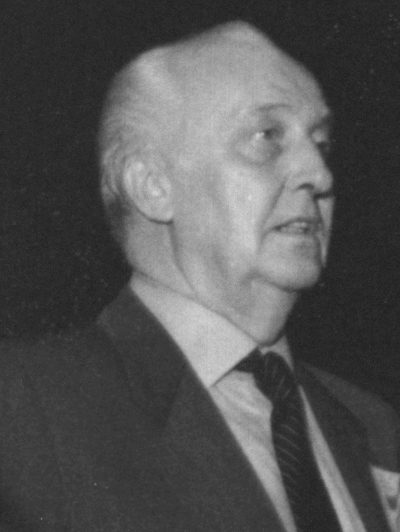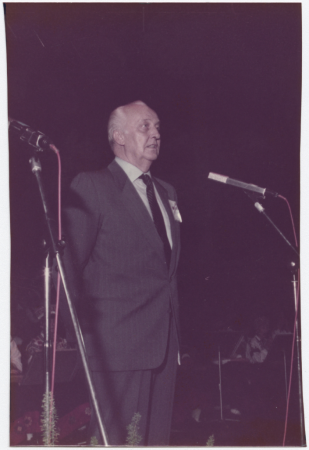Jānis Muhks
1921–2004
Entrepreneur, public worker in exile
Janis Muhks (Muchks) was born on 4 January 1921 in Riga into the family of journalist Arvida Muhka (Arvīda Muhka, pseudonym – Anna Muhka) and colonel, court-martial judge Hermanis Muhks.
In 1940, Muhks graduated from Riga City Gymnasium No. 2, then began his studies at the Faculty of Engineering of the University of Latvia. His studies were interrupted by his enlistment in the Latvian Legion in 1943.
At the end of the war, Muhks was taken prisoner in the so-called English Zone in Germany, and later, together with his wife Rute, whom he met during the war, he lived in a refugee camp in Lübeck, from where he emigrated to Sweden in 1948.
He started working in a warehouse in Stockholm. On reaching retirement age, he was the country manager for Esselte Grako International in six European countries.
He was active in various exile organisations and representations – he was a long-standing member of the Presidium of the European Centre of the Latvian Restoration Committee and of the Swedish Latvian Central Council and Board, and since 1990 was also a member of the Latvian Central Council. Since 1986 he was Chairman of the Board of Publishers of the newspaper “Briva Latvija” (Free Latvia).
He has taken part in almost all exile song festivals on all continents. He was involved in the organising committee of the 3rd European Latvian Song Festival in Cologne (1973) and the 4th European Latvian Song Festival in London (1977), assuming the duties of the head of management.
In June 1979, together with Janis Ritums (Jānis Ritums) and other supportive enthusiasts from Sweden and other countries, he brought to life the dream of his friend, composer, and conductor Alberts Jerums (Alberts Jērums): creation of a song festival in the immediate vicinity of Latvia – the World Free Latvian Song Days on the island of Gotland, Sweden.
The festival was privately initiated and organised without direct support from exile organisations, and it was a great challenge for the organisers economically, organisationally and politically. Around 3500 participants from all over the world arrived in Gotland before Midsummer, and it was later recognised not only as a great celebration, but also as a successful political demonstration on an international level, reminding people of the occupation in Latvia.
After the Gotland Song Days, the World Association of Free Latvians encouraged two more World Song Days, this time in Münster, Germany, in 1984 and 1987. Muhks took over the duties of the chairman of the organising committee of the 1st World Free Latvian Song Days in Europe in Visby (1979), the 2nd World Free Latvian Song Days in Münster (1984) and the 3rd World Free Latvian Song Days in Münster (1987).
In 1996, Muhks returned to live in Latvia. He passed away in 2004 in Riga.
Muhks was awarded the Daugavas Vanagi Golden Badge of Honour.
Information sources
A.C. un A.K. (1991, 14. janvāris). Jānim Muchkam 70. Brīvā Latvija, 2, 7. Brīvā Latvija: Apvienotā "Londonas Avīze" un "Latvija", Nr.2 (14.01.1991) (periodika.lv)
Muhka, A. (2022. gada 29. janvāris). Biogrāfija. [Elektroniska vēstule Latvijas Nacionālajai bibliotēkai]




